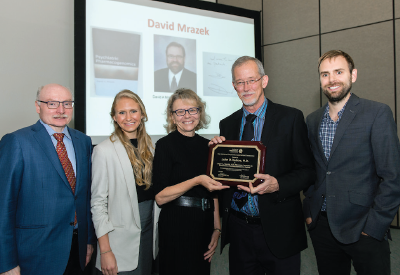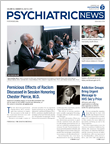Increasing evidence suggests that bipolar disorder that improves with the use of lithium is a genetically distinct form of the illness, said John Kelsoe, M.D., at APA’s 2017 Annual Meeting in San Diego in May.
Kelsoe made his remarks after being presented with the David A. Mrazek, M.D., Memorial Award, which recognizes an outstanding clinician in the field of pharmacogenomics.
“Bipolar disorder is about 70 to 80 percent genetic, and genomewide association studies have discovered at least 19 to 30 genes so far,” said Kelsoe, a professor of psychiatry and director of the Laboratory for Psychiatric Genomics at the University of California, San Diego. The prevalence rate in the general population is about 1 percent, but it is 7 to 10 percent among relatives of patients. People carrying some of the alleles might be hyperthymic and more evolutionarily fit, helping to preserve the genes in the population. Bipolar illness arises when that genetic load gets too high.
“If we look for genes that control lithium response, we might find some that are associated with both lithium response and bipolar disorder,” he said. “I propose that these are genes that predispose to a form of bipolar disorder that causes dysfunction in pathways modulated by lithium and define mechanistically separate forms of the illness.”
If such a distinct form of the illness can be detected, thus predicting treatment response, then patients could be diagnosed and treated sooner, he said. On average now, a person with bipolar disorder goes seven years without an accurate diagnosis. In that period, the individual is likely to see at least three physicians and is often misdiagnosed and may be put on drugs that don’t work or may make the condition worse.
Running full-blown genomewide association tests on patients is expensive and probably not productive at this point. However, using pluripotent stem cells could identify candidate genes that indicate lithium responders, a new technology Kelsoe called “the most revolutionary thing in psychiatry in 100 years.” It is now being explored by a number of researchers.
Neurons derived from patients’ stem cells grown in the lab betray their origins, he said. “Bipolar neurons are like bipolar patients—very busy.”
Those cells exhibit three times the rate of spontaneous action potentials compared with cells from healthy individuals. Adding lithium to stem cells from lithium-responding patients rescues them from the high firing rate. “We recapitulated in the dish the clinical response we saw in the patients, but there was little effect on cells from nonresponders,” he said.
Kelsoe suggested that bipolar patients may show decreased function of GABA receptors and increased function of voltage-gated calcium channels, a combination that alters the action of pyramidal cells by “inhibiting the inhibitors.”
“This is probably a defect in the channel that lets ions into the cell,” he said. “What that means is unclear, but that cellular phenotype of hyperexcitability gives us something to look for.”
Once it took eight weeks to grow stem cells; now it can be done in two days. That time may decrease to the point that predicting drug response could take place while the patient waits in the clinic.
“We’d like to identify the diagnosis early on based on DNA testing that points to a specific treatment and gets the patient better in a couple of months versus a couple of years,” he said. ■
“Genetic Variants Associated With Response to Lithium Treatment In Bipolar Disorder: A Genome-Wide Association Study” can be accessed
here.

